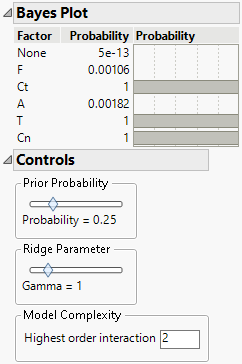Example of a Bayes Plot for Active Factors
Use the Standard Least Squares personality of the Fit Model platform to determine which factors in an experimental design are active. Use a Bayes plot to identify active factors. One type of Bayes plot is available as an option under Effect Screening in the Response red triangle menu. This example illustrates a script that uses an alternative formulation of the Bayesian approach and allows for the possible models to include higher-order terms in constructing the Bayes plot.
1. Select Help > Sample Data Folder and open Reactor.jmp.
2. In the Samples > Scripts folder, open the BayesPlotforFactors.jsl sample script.
3. Select Edit > Run Script.
4. Select Y and click Y, Response.
5. Select F, Ct, A, T, and Cn and click X, Factor.Click OK.
Figure 4.61 Bayes Plot for Factor Activity
The Model Complexity indicates that the highest order interaction to consider is two. Therefore, all possible models that include up to second-order interactions are constructed. Based on the value assigned to Prior Probability, a posterior probability is computed for each of the possible models. The probability for a factor is the sum of the probabilities for each of the models where it was involved.
This approach identifies Ct, T, and Cn as active factors, and A and F as inactive.
If the ridge parameter were zero (not allowed), all the models would be fit by least squares. As the ridge parameter increases, the parameter estimates for any model shrink toward zero. For more information about the ridge parameter, and why it cannot be zero, see Box and Meyer (1993).
